Economic Philosophies: Capitalism and Socialism Compared
VerifiedAdded on 2023/06/10
|6
|1711
|405
Essay
AI Summary
This essay provides a comprehensive comparison of capitalism and socialism, two pivotal economic systems that have shaped global economies. It begins by tracing the historical development of both systems, highlighting the rise of capitalism from the Middle Ages and the emergence of socialism as a response to capitalism's perceived shortcomings. The essay then delves into a detailed comparative analysis, examining the core principles, driving mechanisms, and government interference levels of each system. It explores the similarities, such as the existence of democracy and scarcity, and contrasts the principles of individual rights versus equality, the role of innovation and individual goals versus equality and fairness, and the degree of government intervention. The essay concludes by emphasizing the importance of both systems in the modern globalized world, advocating for a mixed economy that incorporates the strengths of both capitalism and socialism to ensure economic prosperity and equitable resource distribution. The document is contributed by a student to be published on the website Desklib. Desklib is a platform which provides all the necessary AI based study tools for students.

Running head: PHILOSOPHY OF BUSINESS
Paraphrase This Document
Need a fresh take? Get an instant paraphrase of this document with our AI Paraphraser
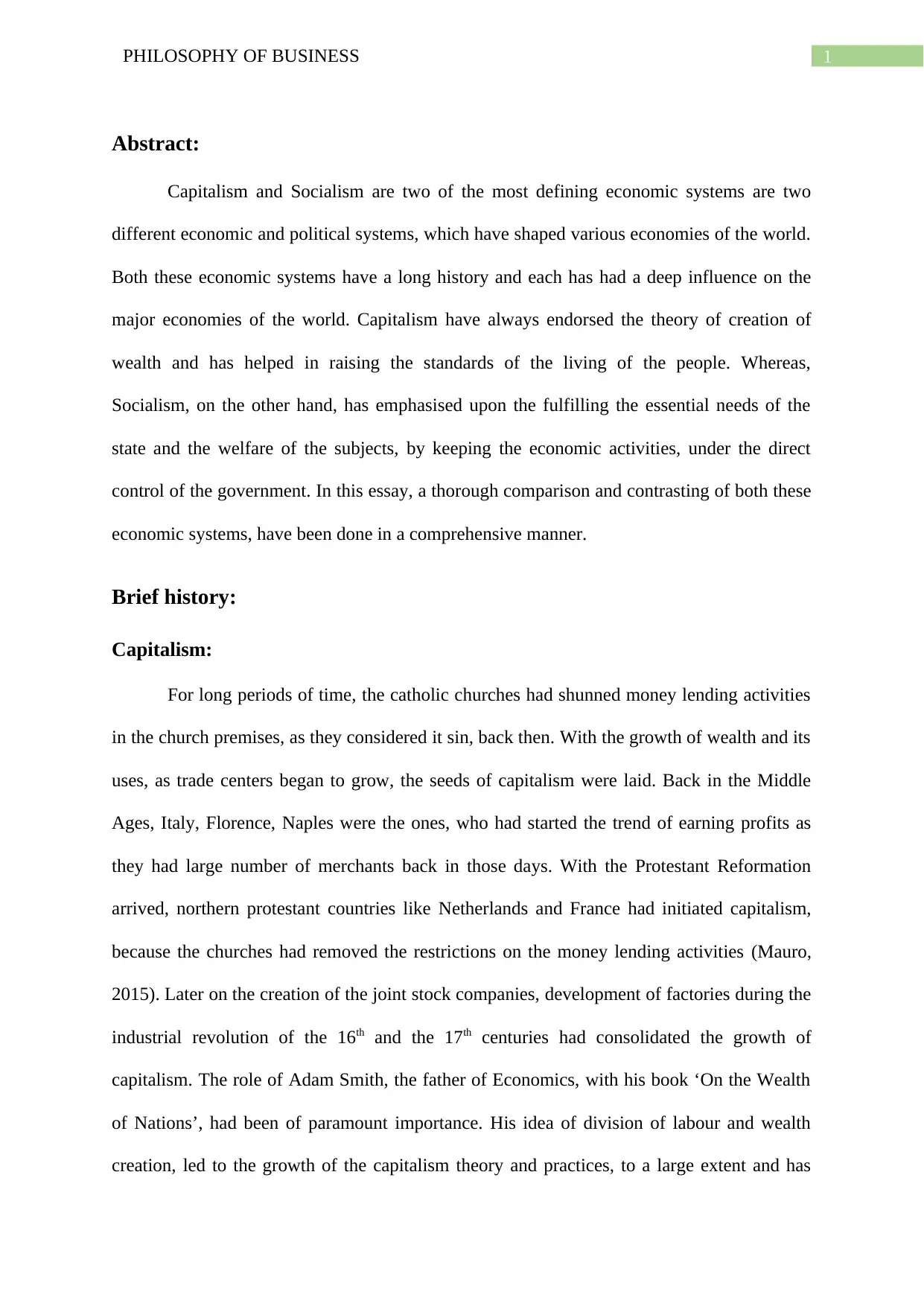
1PHILOSOPHY OF BUSINESS
Abstract:
Capitalism and Socialism are two of the most defining economic systems are two
different economic and political systems, which have shaped various economies of the world.
Both these economic systems have a long history and each has had a deep influence on the
major economies of the world. Capitalism have always endorsed the theory of creation of
wealth and has helped in raising the standards of the living of the people. Whereas,
Socialism, on the other hand, has emphasised upon the fulfilling the essential needs of the
state and the welfare of the subjects, by keeping the economic activities, under the direct
control of the government. In this essay, a thorough comparison and contrasting of both these
economic systems, have been done in a comprehensive manner.
Brief history:
Capitalism:
For long periods of time, the catholic churches had shunned money lending activities
in the church premises, as they considered it sin, back then. With the growth of wealth and its
uses, as trade centers began to grow, the seeds of capitalism were laid. Back in the Middle
Ages, Italy, Florence, Naples were the ones, who had started the trend of earning profits as
they had large number of merchants back in those days. With the Protestant Reformation
arrived, northern protestant countries like Netherlands and France had initiated capitalism,
because the churches had removed the restrictions on the money lending activities (Mauro,
2015). Later on the creation of the joint stock companies, development of factories during the
industrial revolution of the 16th and the 17th centuries had consolidated the growth of
capitalism. The role of Adam Smith, the father of Economics, with his book ‘On the Wealth
of Nations’, had been of paramount importance. His idea of division of labour and wealth
creation, led to the growth of the capitalism theory and practices, to a large extent and has
Abstract:
Capitalism and Socialism are two of the most defining economic systems are two
different economic and political systems, which have shaped various economies of the world.
Both these economic systems have a long history and each has had a deep influence on the
major economies of the world. Capitalism have always endorsed the theory of creation of
wealth and has helped in raising the standards of the living of the people. Whereas,
Socialism, on the other hand, has emphasised upon the fulfilling the essential needs of the
state and the welfare of the subjects, by keeping the economic activities, under the direct
control of the government. In this essay, a thorough comparison and contrasting of both these
economic systems, have been done in a comprehensive manner.
Brief history:
Capitalism:
For long periods of time, the catholic churches had shunned money lending activities
in the church premises, as they considered it sin, back then. With the growth of wealth and its
uses, as trade centers began to grow, the seeds of capitalism were laid. Back in the Middle
Ages, Italy, Florence, Naples were the ones, who had started the trend of earning profits as
they had large number of merchants back in those days. With the Protestant Reformation
arrived, northern protestant countries like Netherlands and France had initiated capitalism,
because the churches had removed the restrictions on the money lending activities (Mauro,
2015). Later on the creation of the joint stock companies, development of factories during the
industrial revolution of the 16th and the 17th centuries had consolidated the growth of
capitalism. The role of Adam Smith, the father of Economics, with his book ‘On the Wealth
of Nations’, had been of paramount importance. His idea of division of labour and wealth
creation, led to the growth of the capitalism theory and practices, to a large extent and has
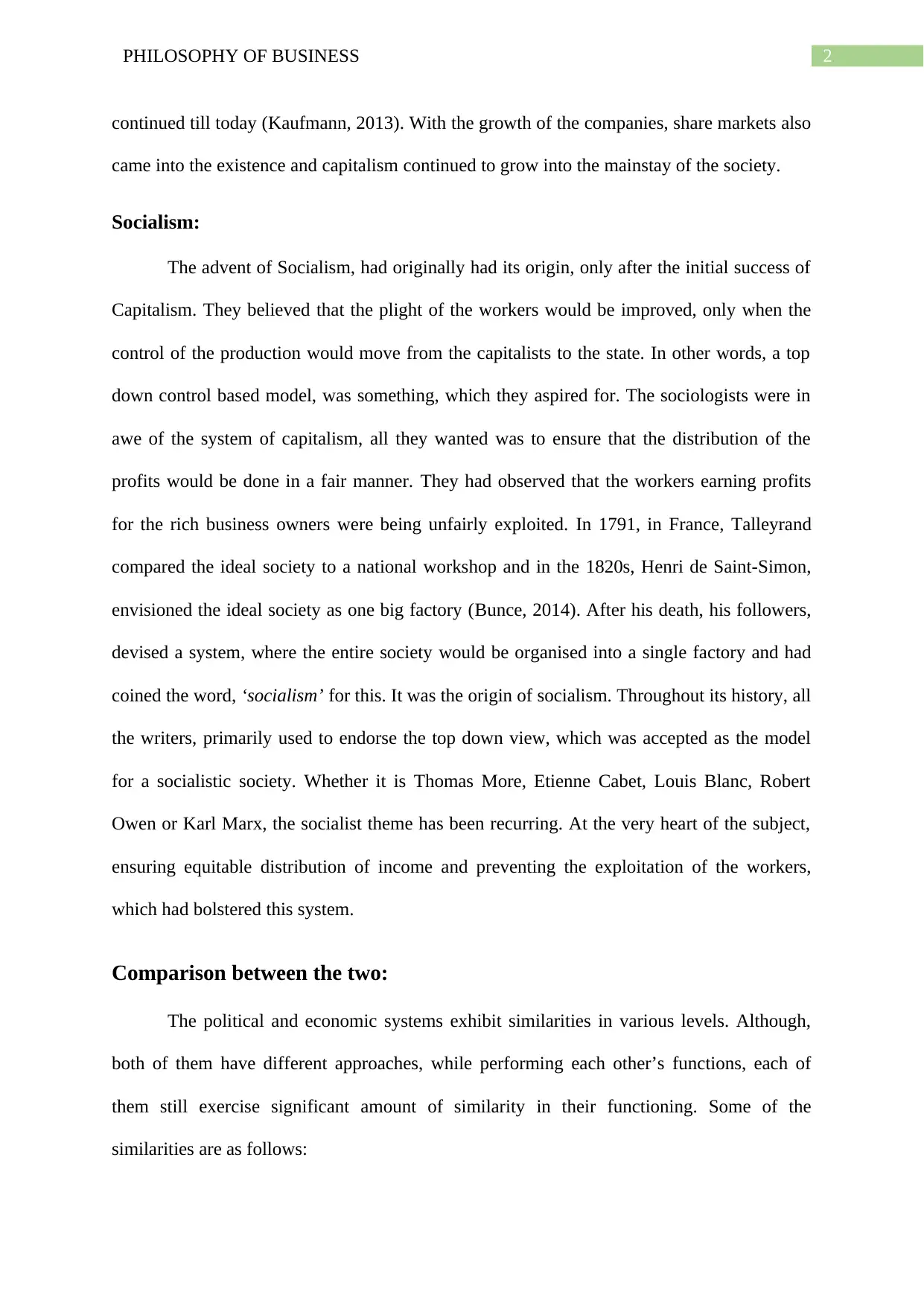
2PHILOSOPHY OF BUSINESS
continued till today (Kaufmann, 2013). With the growth of the companies, share markets also
came into the existence and capitalism continued to grow into the mainstay of the society.
Socialism:
The advent of Socialism, had originally had its origin, only after the initial success of
Capitalism. They believed that the plight of the workers would be improved, only when the
control of the production would move from the capitalists to the state. In other words, a top
down control based model, was something, which they aspired for. The sociologists were in
awe of the system of capitalism, all they wanted was to ensure that the distribution of the
profits would be done in a fair manner. They had observed that the workers earning profits
for the rich business owners were being unfairly exploited. In 1791, in France, Talleyrand
compared the ideal society to a national workshop and in the 1820s, Henri de Saint-Simon,
envisioned the ideal society as one big factory (Bunce, 2014). After his death, his followers,
devised a system, where the entire society would be organised into a single factory and had
coined the word, ‘socialism’ for this. It was the origin of socialism. Throughout its history, all
the writers, primarily used to endorse the top down view, which was accepted as the model
for a socialistic society. Whether it is Thomas More, Etienne Cabet, Louis Blanc, Robert
Owen or Karl Marx, the socialist theme has been recurring. At the very heart of the subject,
ensuring equitable distribution of income and preventing the exploitation of the workers,
which had bolstered this system.
Comparison between the two:
The political and economic systems exhibit similarities in various levels. Although,
both of them have different approaches, while performing each other’s functions, each of
them still exercise significant amount of similarity in their functioning. Some of the
similarities are as follows:
continued till today (Kaufmann, 2013). With the growth of the companies, share markets also
came into the existence and capitalism continued to grow into the mainstay of the society.
Socialism:
The advent of Socialism, had originally had its origin, only after the initial success of
Capitalism. They believed that the plight of the workers would be improved, only when the
control of the production would move from the capitalists to the state. In other words, a top
down control based model, was something, which they aspired for. The sociologists were in
awe of the system of capitalism, all they wanted was to ensure that the distribution of the
profits would be done in a fair manner. They had observed that the workers earning profits
for the rich business owners were being unfairly exploited. In 1791, in France, Talleyrand
compared the ideal society to a national workshop and in the 1820s, Henri de Saint-Simon,
envisioned the ideal society as one big factory (Bunce, 2014). After his death, his followers,
devised a system, where the entire society would be organised into a single factory and had
coined the word, ‘socialism’ for this. It was the origin of socialism. Throughout its history, all
the writers, primarily used to endorse the top down view, which was accepted as the model
for a socialistic society. Whether it is Thomas More, Etienne Cabet, Louis Blanc, Robert
Owen or Karl Marx, the socialist theme has been recurring. At the very heart of the subject,
ensuring equitable distribution of income and preventing the exploitation of the workers,
which had bolstered this system.
Comparison between the two:
The political and economic systems exhibit similarities in various levels. Although,
both of them have different approaches, while performing each other’s functions, each of
them still exercise significant amount of similarity in their functioning. Some of the
similarities are as follows:
⊘ This is a preview!⊘
Do you want full access?
Subscribe today to unlock all pages.

Trusted by 1+ million students worldwide
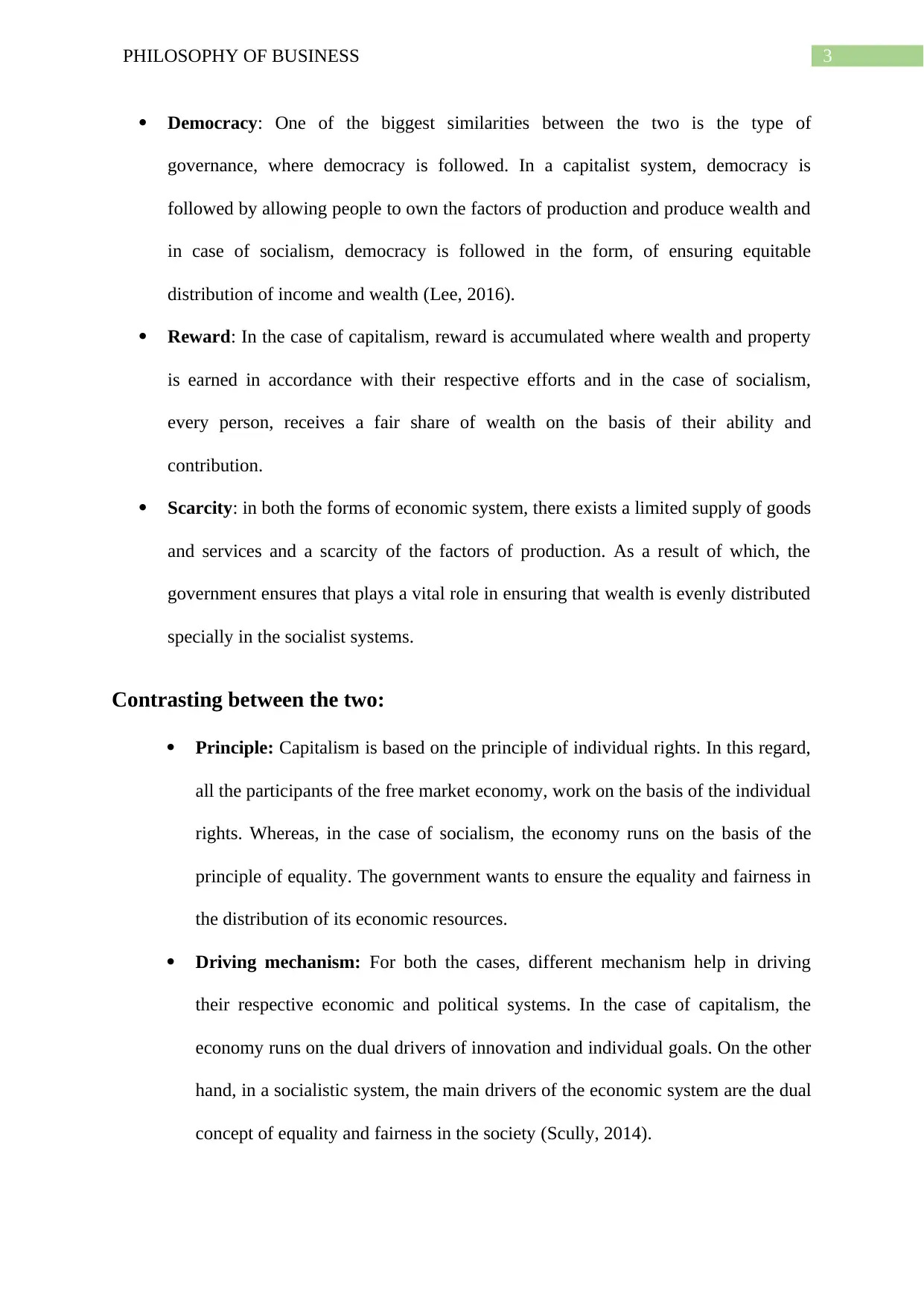
3PHILOSOPHY OF BUSINESS
Democracy: One of the biggest similarities between the two is the type of
governance, where democracy is followed. In a capitalist system, democracy is
followed by allowing people to own the factors of production and produce wealth and
in case of socialism, democracy is followed in the form, of ensuring equitable
distribution of income and wealth (Lee, 2016).
Reward: In the case of capitalism, reward is accumulated where wealth and property
is earned in accordance with their respective efforts and in the case of socialism,
every person, receives a fair share of wealth on the basis of their ability and
contribution.
Scarcity: in both the forms of economic system, there exists a limited supply of goods
and services and a scarcity of the factors of production. As a result of which, the
government ensures that plays a vital role in ensuring that wealth is evenly distributed
specially in the socialist systems.
Contrasting between the two:
Principle: Capitalism is based on the principle of individual rights. In this regard,
all the participants of the free market economy, work on the basis of the individual
rights. Whereas, in the case of socialism, the economy runs on the basis of the
principle of equality. The government wants to ensure the equality and fairness in
the distribution of its economic resources.
Driving mechanism: For both the cases, different mechanism help in driving
their respective economic and political systems. In the case of capitalism, the
economy runs on the dual drivers of innovation and individual goals. On the other
hand, in a socialistic system, the main drivers of the economic system are the dual
concept of equality and fairness in the society (Scully, 2014).
Democracy: One of the biggest similarities between the two is the type of
governance, where democracy is followed. In a capitalist system, democracy is
followed by allowing people to own the factors of production and produce wealth and
in case of socialism, democracy is followed in the form, of ensuring equitable
distribution of income and wealth (Lee, 2016).
Reward: In the case of capitalism, reward is accumulated where wealth and property
is earned in accordance with their respective efforts and in the case of socialism,
every person, receives a fair share of wealth on the basis of their ability and
contribution.
Scarcity: in both the forms of economic system, there exists a limited supply of goods
and services and a scarcity of the factors of production. As a result of which, the
government ensures that plays a vital role in ensuring that wealth is evenly distributed
specially in the socialist systems.
Contrasting between the two:
Principle: Capitalism is based on the principle of individual rights. In this regard,
all the participants of the free market economy, work on the basis of the individual
rights. Whereas, in the case of socialism, the economy runs on the basis of the
principle of equality. The government wants to ensure the equality and fairness in
the distribution of its economic resources.
Driving mechanism: For both the cases, different mechanism help in driving
their respective economic and political systems. In the case of capitalism, the
economy runs on the dual drivers of innovation and individual goals. On the other
hand, in a socialistic system, the main drivers of the economic system are the dual
concept of equality and fairness in the society (Scully, 2014).
Paraphrase This Document
Need a fresh take? Get an instant paraphrase of this document with our AI Paraphraser
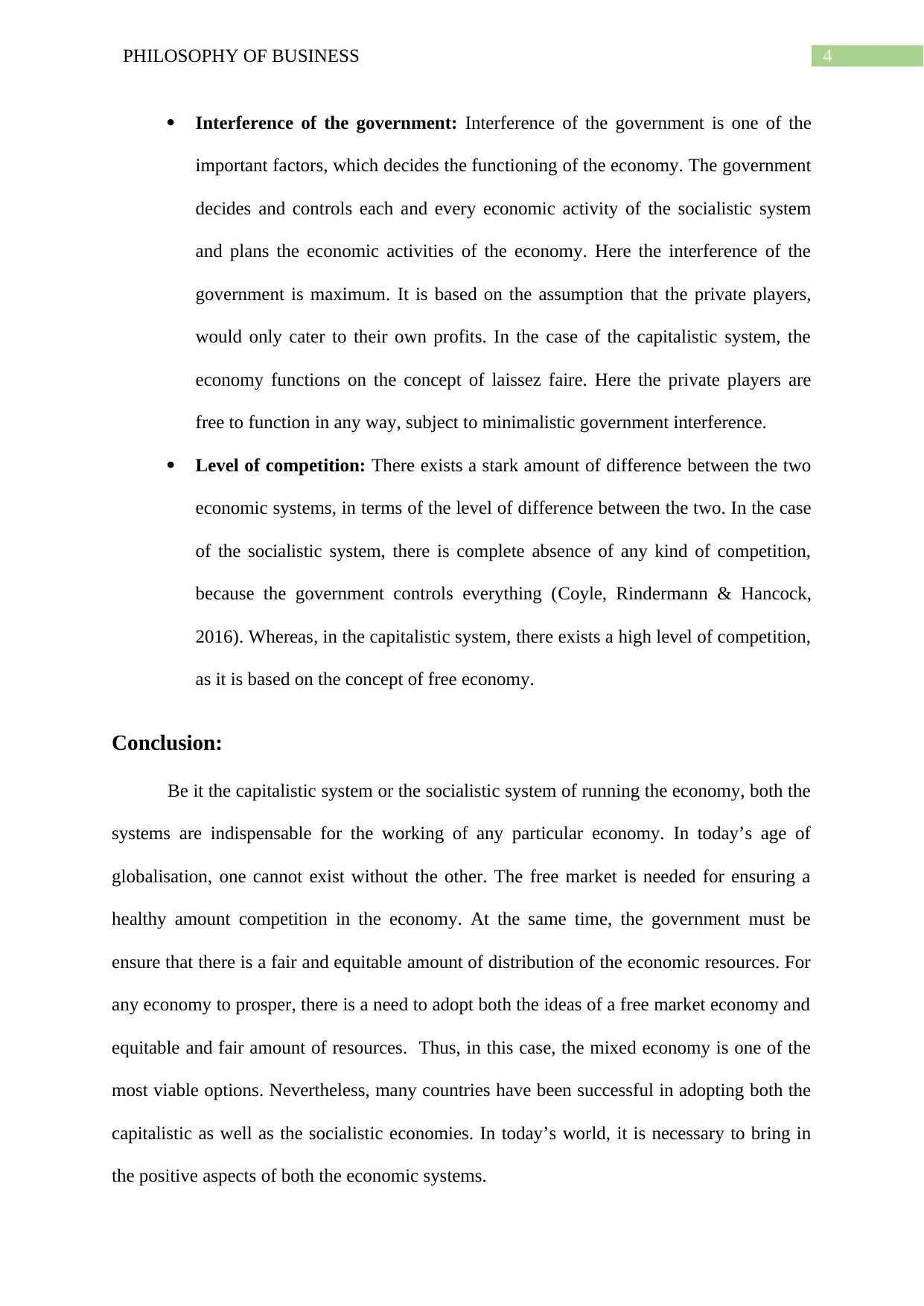
4PHILOSOPHY OF BUSINESS
Interference of the government: Interference of the government is one of the
important factors, which decides the functioning of the economy. The government
decides and controls each and every economic activity of the socialistic system
and plans the economic activities of the economy. Here the interference of the
government is maximum. It is based on the assumption that the private players,
would only cater to their own profits. In the case of the capitalistic system, the
economy functions on the concept of laissez faire. Here the private players are
free to function in any way, subject to minimalistic government interference.
Level of competition: There exists a stark amount of difference between the two
economic systems, in terms of the level of difference between the two. In the case
of the socialistic system, there is complete absence of any kind of competition,
because the government controls everything (Coyle, Rindermann & Hancock,
2016). Whereas, in the capitalistic system, there exists a high level of competition,
as it is based on the concept of free economy.
Conclusion:
Be it the capitalistic system or the socialistic system of running the economy, both the
systems are indispensable for the working of any particular economy. In today’s age of
globalisation, one cannot exist without the other. The free market is needed for ensuring a
healthy amount competition in the economy. At the same time, the government must be
ensure that there is a fair and equitable amount of distribution of the economic resources. For
any economy to prosper, there is a need to adopt both the ideas of a free market economy and
equitable and fair amount of resources. Thus, in this case, the mixed economy is one of the
most viable options. Nevertheless, many countries have been successful in adopting both the
capitalistic as well as the socialistic economies. In today’s world, it is necessary to bring in
the positive aspects of both the economic systems.
Interference of the government: Interference of the government is one of the
important factors, which decides the functioning of the economy. The government
decides and controls each and every economic activity of the socialistic system
and plans the economic activities of the economy. Here the interference of the
government is maximum. It is based on the assumption that the private players,
would only cater to their own profits. In the case of the capitalistic system, the
economy functions on the concept of laissez faire. Here the private players are
free to function in any way, subject to minimalistic government interference.
Level of competition: There exists a stark amount of difference between the two
economic systems, in terms of the level of difference between the two. In the case
of the socialistic system, there is complete absence of any kind of competition,
because the government controls everything (Coyle, Rindermann & Hancock,
2016). Whereas, in the capitalistic system, there exists a high level of competition,
as it is based on the concept of free economy.
Conclusion:
Be it the capitalistic system or the socialistic system of running the economy, both the
systems are indispensable for the working of any particular economy. In today’s age of
globalisation, one cannot exist without the other. The free market is needed for ensuring a
healthy amount competition in the economy. At the same time, the government must be
ensure that there is a fair and equitable amount of distribution of the economic resources. For
any economy to prosper, there is a need to adopt both the ideas of a free market economy and
equitable and fair amount of resources. Thus, in this case, the mixed economy is one of the
most viable options. Nevertheless, many countries have been successful in adopting both the
capitalistic as well as the socialistic economies. In today’s world, it is necessary to bring in
the positive aspects of both the economic systems.
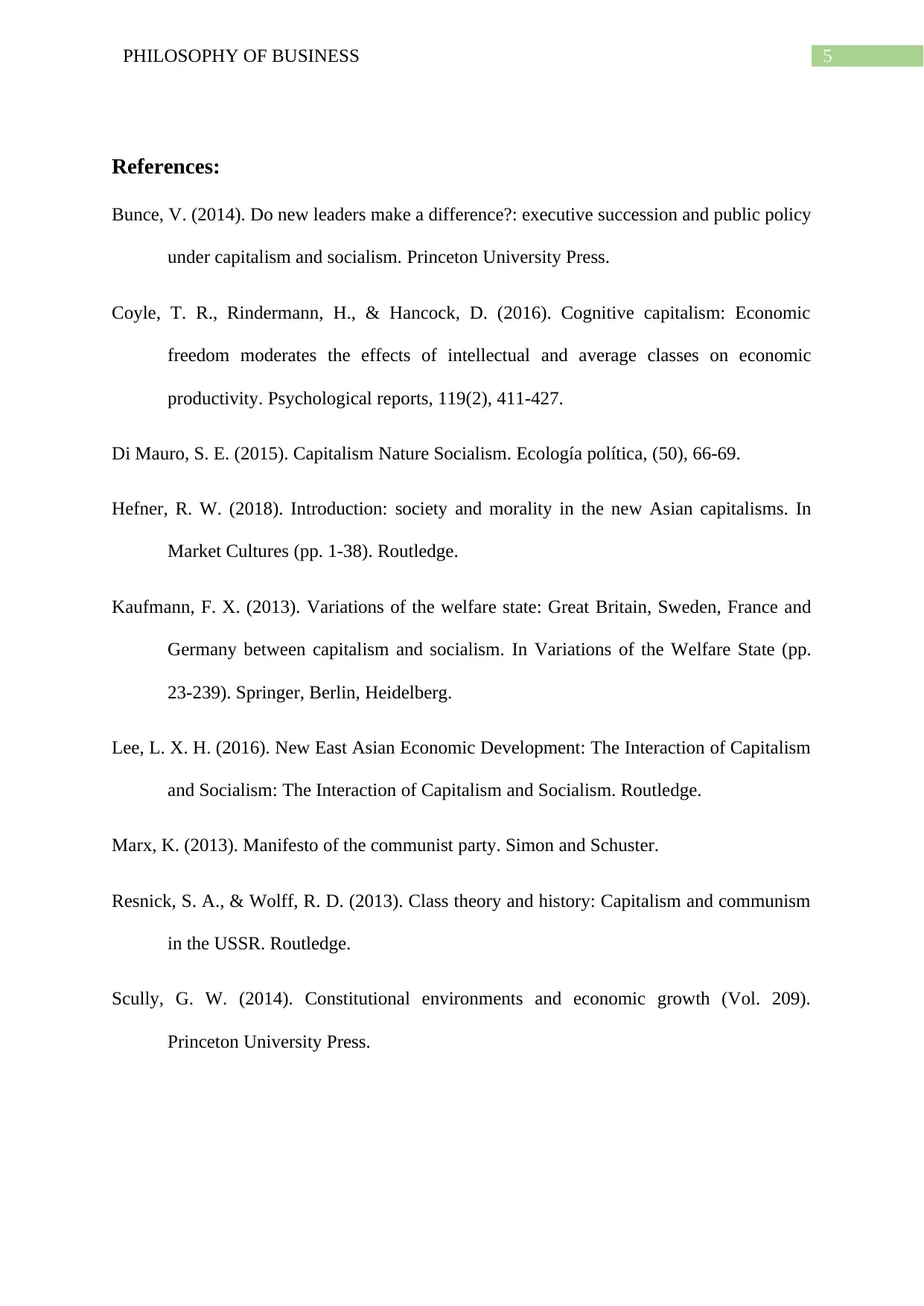
5PHILOSOPHY OF BUSINESS
References:
Bunce, V. (2014). Do new leaders make a difference?: executive succession and public policy
under capitalism and socialism. Princeton University Press.
Coyle, T. R., Rindermann, H., & Hancock, D. (2016). Cognitive capitalism: Economic
freedom moderates the effects of intellectual and average classes on economic
productivity. Psychological reports, 119(2), 411-427.
Di Mauro, S. E. (2015). Capitalism Nature Socialism. Ecología política, (50), 66-69.
Hefner, R. W. (2018). Introduction: society and morality in the new Asian capitalisms. In
Market Cultures (pp. 1-38). Routledge.
Kaufmann, F. X. (2013). Variations of the welfare state: Great Britain, Sweden, France and
Germany between capitalism and socialism. In Variations of the Welfare State (pp.
23-239). Springer, Berlin, Heidelberg.
Lee, L. X. H. (2016). New East Asian Economic Development: The Interaction of Capitalism
and Socialism: The Interaction of Capitalism and Socialism. Routledge.
Marx, K. (2013). Manifesto of the communist party. Simon and Schuster.
Resnick, S. A., & Wolff, R. D. (2013). Class theory and history: Capitalism and communism
in the USSR. Routledge.
Scully, G. W. (2014). Constitutional environments and economic growth (Vol. 209).
Princeton University Press.
References:
Bunce, V. (2014). Do new leaders make a difference?: executive succession and public policy
under capitalism and socialism. Princeton University Press.
Coyle, T. R., Rindermann, H., & Hancock, D. (2016). Cognitive capitalism: Economic
freedom moderates the effects of intellectual and average classes on economic
productivity. Psychological reports, 119(2), 411-427.
Di Mauro, S. E. (2015). Capitalism Nature Socialism. Ecología política, (50), 66-69.
Hefner, R. W. (2018). Introduction: society and morality in the new Asian capitalisms. In
Market Cultures (pp. 1-38). Routledge.
Kaufmann, F. X. (2013). Variations of the welfare state: Great Britain, Sweden, France and
Germany between capitalism and socialism. In Variations of the Welfare State (pp.
23-239). Springer, Berlin, Heidelberg.
Lee, L. X. H. (2016). New East Asian Economic Development: The Interaction of Capitalism
and Socialism: The Interaction of Capitalism and Socialism. Routledge.
Marx, K. (2013). Manifesto of the communist party. Simon and Schuster.
Resnick, S. A., & Wolff, R. D. (2013). Class theory and history: Capitalism and communism
in the USSR. Routledge.
Scully, G. W. (2014). Constitutional environments and economic growth (Vol. 209).
Princeton University Press.
⊘ This is a preview!⊘
Do you want full access?
Subscribe today to unlock all pages.

Trusted by 1+ million students worldwide
1 out of 6
Related Documents
Your All-in-One AI-Powered Toolkit for Academic Success.
+13062052269
info@desklib.com
Available 24*7 on WhatsApp / Email
![[object Object]](/_next/static/media/star-bottom.7253800d.svg)
Unlock your academic potential
Copyright © 2020–2026 A2Z Services. All Rights Reserved. Developed and managed by ZUCOL.





